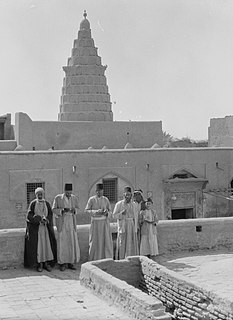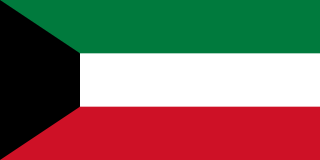Related Research Articles

The Judeo-Arabic dialects (Arabic: عربية يهودية ; Hebrew: ערבית יהודית are a continuum of specifically Jewish varieties of Arabic formerly spoken by the Jewish communities of the Middle East and North Africa. The term Judeo-Arabic can also refer to Classical Arabic written in the Hebrew script, particularly in the Middle Ages.
Mizrahi Jews or Mizrahim (מִזְרָחִים), also sometimes referred to as Mizrachi (מִזְרָחִי), Edot HaMizrach or Oriental Jews, are the descendants of the local Jewish communities that had existed in Western Asia and North Africa from Biblical times into the modern era.

Farhud was the pogrom or "violent dispossession" carried out against the Jewish population of Baghdad, Iraq, on June 1–2, 1941, immediately following the British victory in the Anglo-Iraqi War. The riots occurred in a power vacuum following the collapse of the pro-Nazi government of Rashid Ali while the city was in a state of instability. The violence came immediately after the rapid defeat of Rashid Ali by British forces, whose earlier coup had generated a short period of national euphoria, and was fueled by allegations that Iraqi Jews had aided the British. Over 180 Jews were killed and 1,000 injured, although some non-Jewish rioters were also killed in the attempt to quell the violence. Looting of Jewish property took place and 900 Jewish homes were destroyed.
The former communities of Jewish migrants and their descendants from Baghdad and elsewhere in the Middle East are traditionally called Baghdadi Jews or Indo-Iraqi Jews. They settled primarily in the ports and along the trade routes around the Indian Ocean and the South China Sea.

The history of the Jews in Iraq is documented from the time of the Babylonian captivity c. 586 BC. Iraqi Jews constitute one of the world's oldest and most historically significant Jewish communities.

From 1951 to 1952, Operation Ezra and Nehemiah airlifted between 120,000 and 130,000 Iraqi Jews to Israel via Iran and Cyprus. The massive emigration of Iraqi Jews was among the most climactic events of the Jewish exodus from Arab and Muslim countries.

The Jews of Kurdistan are the Mizrahi Jewish communities native to the geographic region of Kurdistan, roughly covering parts of northwestern Iran, northern Iraq, northeastern Syria and southeastern Turkey. Kurdish Jews lived as closed ethnic communities until they were expelled from Arab and Muslim states from the 1940s–1950s onward. The community largely speaks Judeo-Aramaic and Kurdish languages, with the Kurmanji dialect of Iraqi Kurdistan being the most prevalent. As Kurdish Jews natively adhere to Judaism and originate from the Middle East, Mizrahi Hebrew is used for liturgy. Many Kurdish Jews, especially the ones who hail from Iraq, went through a Sephardic Jewish blending during the 18th century.
Asenath Barzani, was a Jewish-Kurdish female rabbinical scholar and poet who lived near Duhok, Kurdistan.

Iraqi people are people who originate from the country of Iraq.
Ya'qub Bilbul (1920–2003) was an Iraqi Jewish writer. His literary works were published in Arabic, and he achieved recognition as early as 1936 after publishing an article in the Iraqi journal, Al-Hatif. Known for his naturalistic stories, he is considered one of the first writers of social realist fiction in Iraq, and a pioneer of the Iraqi novel and short story.
Baghdad Jewish Arabic or autonymhaki mal yihud or el-haki malna is the Arabic dialect spoken by the Jews of Baghdad and other towns of Southern Iraq. This dialect differs from the dialect spoken by the Jews in Northern Iraq, such as Mosul and 'Ana. The Baghdadi and Northern dialects may be regarded as subvarieties of Judeo-Iraqi Arabic. As with most Judeo-Arab communities, there are likely to be few, if any, speakers of the Judeo-Iraqi Arabic dialects who still reside within Iraq. Rather these dialects have been maintained or are facing critical endangerment within respective Judeo-Iraqi diasporas, namely those of Israel and the United States. In 2014, the film Farewell Baghdad, which is performed mostly in Jewish Baghdadi Arabic dialect, became the first film to be almost completely performed in Judeo-Iraqi Arabic.

Rachel Wahba is a writer of Mizrahi/Sephardic Jewish topics and a psychotherapist in private practice in San Francisco and in Marin County. She has written extensively about her mother's traumatic experience during the Farhud, the pogrom carried out against the Jewish population of Baghdad on June 1941.

The history of the Jews in Kuwait is closely connected to the history of the Jews in Iraq.

The history of the Jews in the Arabian Peninsula dates back to Biblical times. The Arabian Peninsula is defined as including the present-day countries of Bahrain, Kuwait, Oman, Qatar, Saudi Arabia, United Arab Emirates and Yemen politically and parts of Iraq and Jordan geographically.
The article describes the state of race relations and racism in the Middle East. Racism is widely condemned throughout the world, with 174 states parties to the International Convention on the Elimination of All Forms of Racial Discrimination by April 8, 2011. In different countries, the forms that racism takes may be different for historic, cultural, religious, economic or demographic reasons.
The 1950–1951 Baghdad bombings were a series of bombings of Jewish targets in Baghdad, Iraq, between April 1950 and June 1951.
Khedouri Aboody Zilkha (1884–1956) was an Iraqi-Jewish banker.
Jacob ben Joseph Harofe, also known as Yaakov bar Yosef, was a 19th-century Talmudic scholar and dayan in Baghdad, Iraq. He was considered one of the greatest Torah scholars of his generation. He authored many Torah novellae, homiletics, and commentaries. His most notable disciple was Hakham Abdallah Somekh.

MirS.Baṣrī was an Iraqi Jewish writer, economist, journalist, and poet. Among many public positions he held, Basri served as the head and central leader of Baghdad's Jewish community.
References
- ↑ "Archived copy". Archived from the original on 2005-12-15. Retrieved 2007-09-14.CS1 maint: archived copy as title (link)
- ↑ Alternative-Online Archived August 13, 2007, at the Wayback Machine
- ↑ Middle East
- ↑ Carole Basri. "The Ethnic Cleansing of the Iraqi Jews" (Video). TorahCafe.com is a project of the Rohr Jewish Learning Institute . Torah Cafe.
In 1950 Baghdad was 40% Jewish. Today a handful of Jews remain. Uncover the shocking facts about the ethnic cleansing of Iraq’s Jews and what it means for peace in the Middle East today.